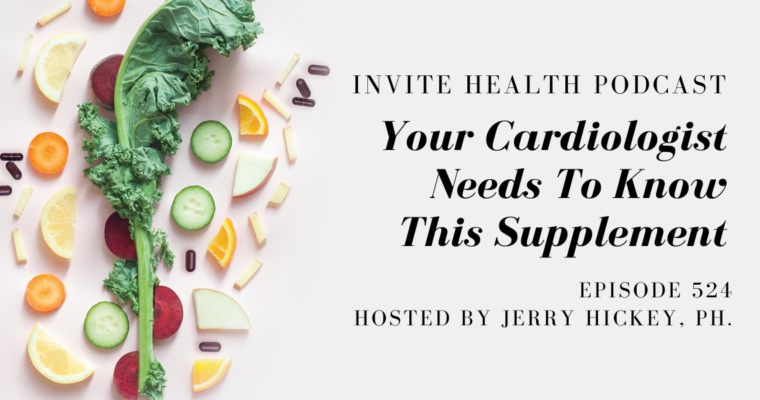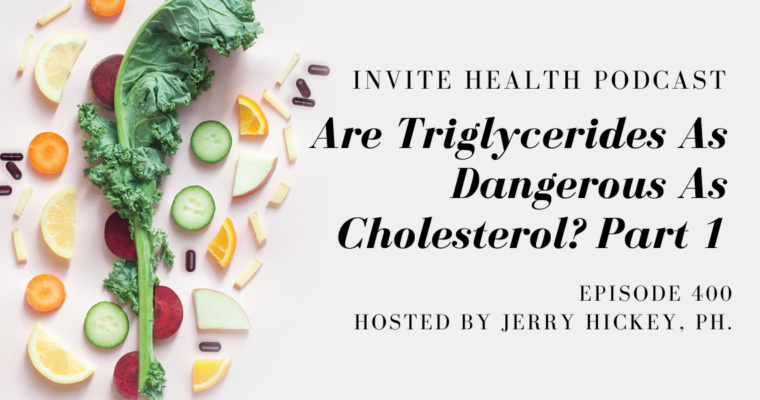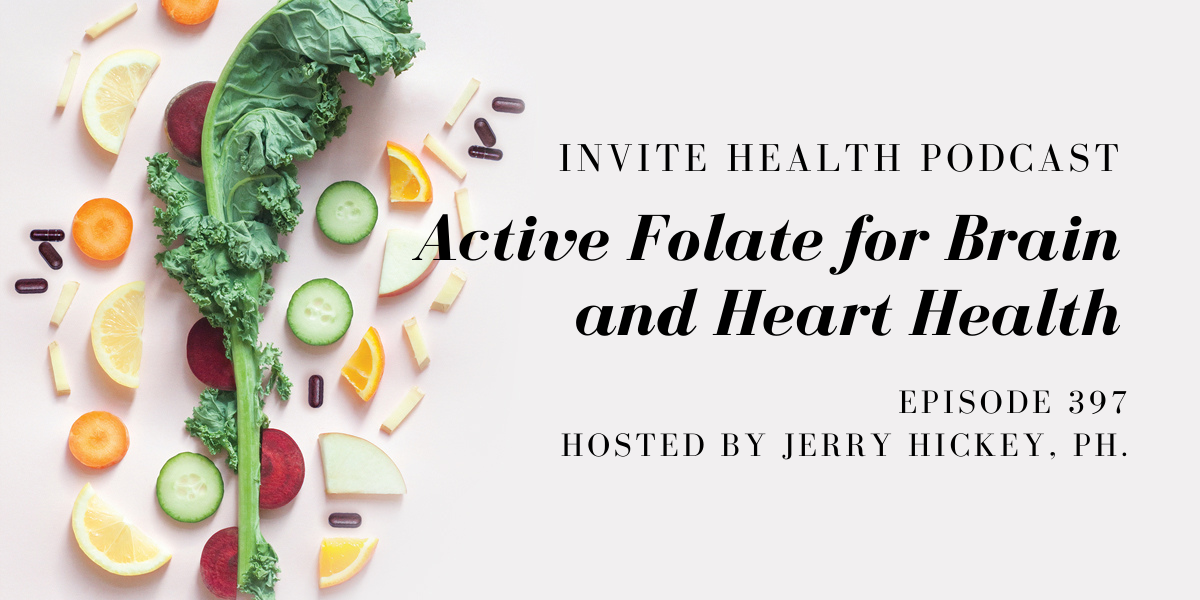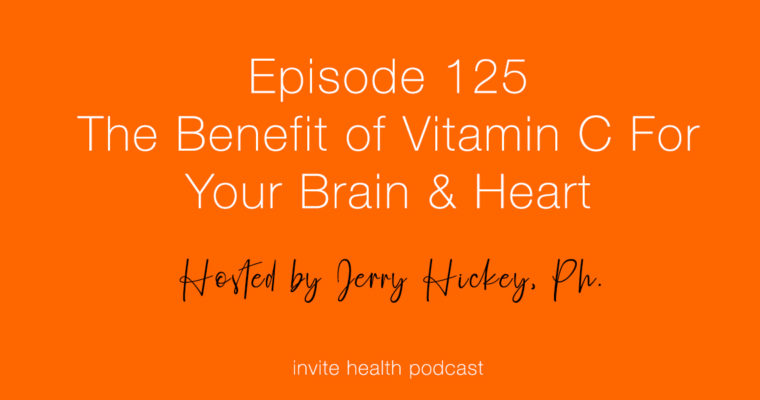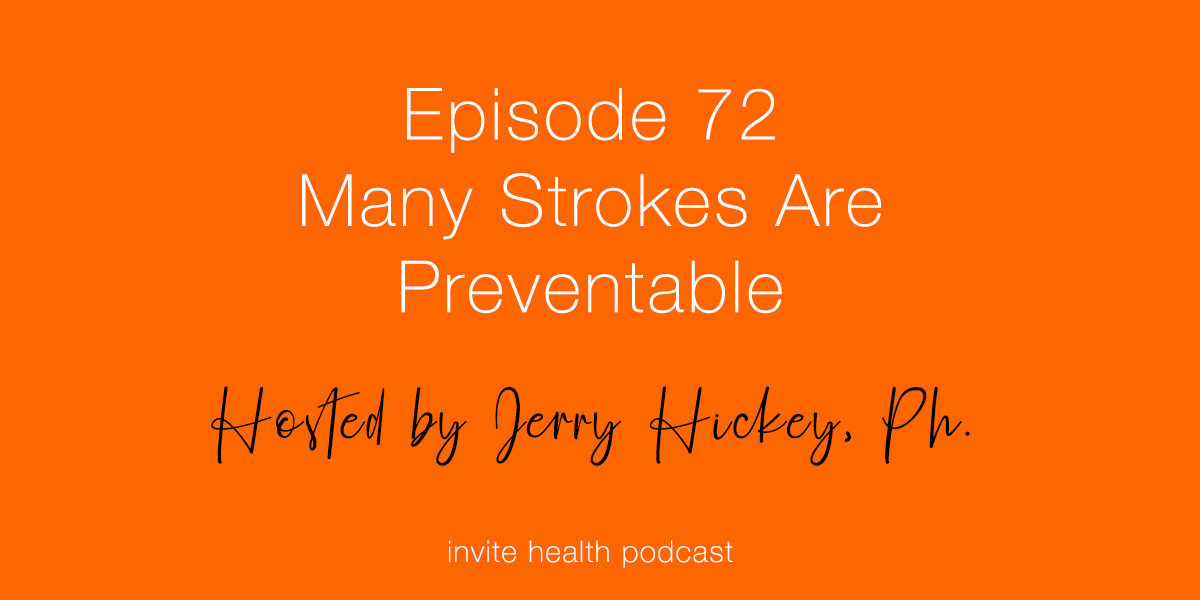Invite Health Podcast, Episode hosted by Jerry Hickey. Ph
Subscribe Today!
Strokes are quite common. They are a leading cause of loss of mobility and independence. Yet many strokes are preventable by making simple adjustments to your lifestyle and changing some of the foods you eat.
What are strokes?
Strokes are a leading cause of long term disability, loss of mobility, loss of independence and even death. A stroke occurs when the blood supply to the brain is reduced or interrupted. When this happens, your brain does not receive enough oxygen or the nutrients it needs to function and your brain cells start to die. Now a TIA – a transient ischemic attack – is really a warning sign that you can have a major stroke in the future. The symptoms pass quickly; frequently, by the time you get to the emergency room, the symptoms may be gone. This is why it is referred to as a mini stroke.
Why Cocoa Is A Superior Heart Health Superfood. Listen Now >>
The most common stroke by far is due to a blockage, called an ischemic stroke. It could be a blood clot or just an embolism that could just be a piece of plaque that broke of the lining of your arteries that went into the brain and blocked the major blood vessels in the brain. Less frequent is a hematocrit stroke. This is when there is bleeding in the brain, which commonly occurs in vegans and vegetarians but also in smokers and people who abuse alcohol.
Warning signs and symptoms, using FAST:
- F – your face droops
- A – your arm gets weak
- S – speech becomes difficult
- T – time to act
Additional warning signs include:
- Confusion
- Numbness
- Sudden vision changes
- Mobility issue
- Sudden headaches (different than a migraine)
The Stats
Every 40 seconds someone in the United States has a stroke. Strokes tend to impact women more commonly than men. They occur twice as often in African American men than white men. Typically, almost 800,000 people a year in the United States suffer with a stroke.
50% of the factors that increase your risk of a stroke can be controlled by a healthier lifestyle. 80% of recurrent strokes can be prevented with the recurrent steps, such as controlling blood pressure and blood sugar.
Preventing A Stroke
First and foremost, you have to work with your doctor on the best methods for you personal health. Generally, the first step is to get your blood tested. You have to treat your diabetes and maintain normal blood sugar, as diabetes is a big risk factor for a stroke. You want to have your cholesterol under control by eating the right foods, exercising regularly and sometimes taking medication. Listen to our Sterols Episode, if you are someone who cannot take a statin drug.
You want to keep your triglycerides under control. High blood pressure is the number one cause of a stroke, following that is atrial fibrillation. Atrial fibrillation is when the top chambers of the heart that pump the blood to the bottom chambers of the heart are quivering or beating faster than normal.
A couple of things not normally looked into but should be:
Other healthy lifestyle changes:
- Follow a healthy diet like the Mediterranean diet that includes vegetables, whole grains and tea
- Ask me about the MIND diet by emailing me at [email protected]
- Quit smoking
- Regular exercise
- Cut down on salt and avoid sugar and processed food
- Cut down on alcohol
- Reduce stress
- Control your triglycerides, blood pressure and blood sugar
There are certain drugs that increase the risk of a stroke:
- Birth control pills
- hormone replacement therapy
- EnzyDes
- Decongestants from cough or allergy medications
Nutrients and Foods That Support Brain and Heart Health
Minerals commonly found in vegetables and fruits like Potassium are extremely important. Only 2% of Americans get sufficient amount of Potassium in their diet. Magnesium found in fish and fresh vegetables, especially green leafy vegetables is important. Low Magnesium levels has been shown to increase your risk of stroke by about 25%. My recommendation? Magnesium Glycinate can supply a lot of Magnesium in one tablet and it is by far the best absorbed Magnesium you can purchase. A second option is Magnesium Citrate, which still has a great deal of Magnesium and is well absorbed but is not quite as good as Magnesium Glycinate. The difference is that Magnesium Citrate is also a stool softener and will work as a laxative. Magnesium Glycinate will not have this effect. Folate or Folic Acid is found in plants but it is hard to absorb. Oddly, a vegetarian eating plants all day long could still be low in folate. Plus, some people cannot convert folate to its active form and a lot of multivitamins out there use that synthetic, inactive form (folic acid). You want to use Methyltetrahydrofolate, which is already the active form of Folate.†
Cocoa gets processed into chocolate through a process called dutching that adds milk fat and sugar that creates the chocolate we all love to snack on. Unfortunately, when this process occurs, a lot of the beneficially ingredients for the heart and brain in cocoa gets damaged, especially flavonols. Cocoa in its original form has been shown to be great for circulation, the heart and the brain. Cocoa found in supermarkets can be tainted with sprays and a heavy metal called cadmium that has been connected to breast cancer. Cocoa as a supplement has to be checked for bacteria, heavy metals and things of that nature. Invite Health takes that steps further by ensuring our ingredients are not sprayed by chemicals, allowing us to offer a non-GMO cocoa supplement.†
A study by UCLA researchers reports that three cups of Green tea a day reduced risk of stroke by 21%. A meta-analysis of nine human clinical trials of 195,000 people concluded that six cups per day reduced the risk of a stroke by an additional 21%, so that means that if you have six cups of green tea a day, according to this study, you cut your risk of stroke by 42%. And the effect was consistent.†
Thank you for tuning in to the Invite Health Podcast. You can find all of our episodes for free wherever you listen to podcasts or by visiting www.invitehealth.com/podcast. Make sure you subscribe and leave us a review! Follow us on Facebook, Twitter and Instagram at Invite Health today. We’ll see you next time on another episode of the Invite Health Podcast.


